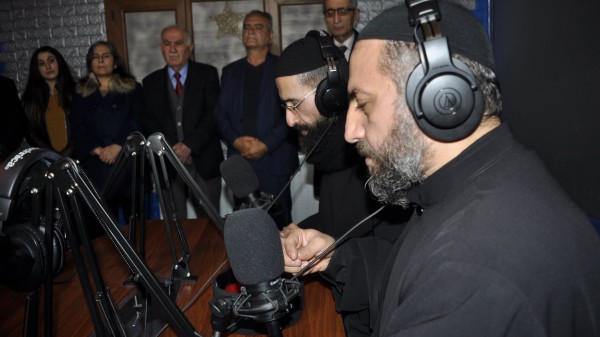
People take part in a radio broadcast on Suroyo FM, in Qamishli, Syria, in a picture uploaded Feb. 3 2020. Facebook/Suroyofm
ishtartv.com
- www.al-monitor.com
QAMISHLI, Syria — A small
radio station in the town of Qamishli, on the border of Turkey and Syria,
has been broadcasting in the ancient Christian liturgical language of
Syriac. The station, run by a husband-and-wife team, is a newcomer to the
multilingual radio scene in Rojava, ruled by the Autonomous Administration
of North and East Syria.
Suroyo FM settled into its regular broadcasts in Syriac and Arabic on Feb. 2, after
three months as a pilot project. Broadcasts in Armenian and
Kurdish are expected to follow within the year.
The station will offer news
reports from correspondents on the ground throughout the volatile region. It will also broadcast on social issues
and the rich cultural heritage of the area inhabited by Arabs, Kurds, Assyrians and Armenians.
“We will have a variety of
programs that cover politics, social issues and
culture,” co-director Samer Hanna told Al-Monitor. “We will
address the culture and history of the Assyrians and mark historical and
religious occasions. We will have special programs on health and women.”
“We are now broadcasting for 12
hours — from 8:00 a.m. to 8:00 p.m. — our news and cultural programs to
this region in the northeast of Syria, including Qamishli, Amouda,
Al-Darbasiyah, Tal Tamr, Al-Hasakah, Qahtaniya and Derik and their
suburbs,” co-director Maria Hanna told Al-Monitor. She is also a
producer and presenter of news programs in Arabic and Syriac.
The station's Feb. 2 official
opening, held at the station in the neighborhood of Al-Arbawiya, was
attended by representatives of the Assyrian community, the autonomous administration and the
local police force.
The radio station, whose slogan
is “Giving a United Voice to Everyone,” employs seven journalists full
time and many correspondents on the ground.
“We also have correspondents in
most cities of northeast Syria who have their ears to the ground, including the
military front lines, such as Tal Tamr and Ain Issa,” Samer said, referring to
the venues of intensified fighting during Turkey’s Olive
Branch Operation.
“These diverse programs are to be
broadcast in Syriac, Assyrian, Chaldean and Arabic,” he said. “We will tackle
the rich heritage of the region — from Assyrian to Chaldean.”
He said that Suroyo FM is an
affiliate of Suroyo
TV, an Assyrian/Chaldean/Syriac satellite television channel that
has been broadcasting for 15 years from its studios in Södertälje,
Sweden.
Journalist Nalin
Boutan told Al-Monitor that media has an important role to play
in promoting cultural and linguistic diversity in the region. “Arabic,
Kurdish, Syriac or Armenian-language journalism, whether print, visual or
audio, is important for developing a multicultural society,” she said.
Khaled al-Qassem, a photojournalist
who works for several foreign agencies in Raqqa, agreed, saying that
linguistic diversity was already present in the media. “There are radio
and TV stations, newspapers and online publications that come out in the
various mother tongues in the region,” he told Al-Monitor. “In Raqqa, there is
Arabic-speaking BISSAN
FM, whose programs mainly cover the cultural and social life of
Raqqa, Deir ez-Zor and Tabaqa and highlight art expos and festivals. In Amouda
city, Arta FM broadcasts
its programs online in Kurdish, Arabic, Syriac and Armenian. Almost all
stations broadcast music in all the languages of the region.”
Boutan told Al-Monitor that
female journalists have a strong presence in Rojava. “Women journalists
have successfully covered battles in Raqqa, Deir ez-Zor, Manbij and Kobani,
among others. They have also succeeded in managing media platforms. Arta FM has
been managed by program presenter Shirine Ibrahim since
2014 and it is a success.”
Boutan noted that the region also
has an all-women radio station. JIN FM has
been broadcasting from Amouda since 2014. “It was the first all-women
station broadcasting in Kurdish. JIN means ‘women’s station’
in Kurdish. The station launched the all-women JIN TV on
March 8, 2018, on International Women’s Day," she said.
|